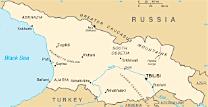The outbreak of hostilities between Georgia and Russia demonstrates the speed with which Eurasia's frozen conflicts can rapidly transform into destabilizing shooting wars. Indeed, the fighting in South Ossetia highlights the danger of allowing these conflicts to simmer under the veil of international management. Over the last decade, the United States and international partners failed to directly challenge the logic of Russia's dual status as both mediator and spoiler in the Georgian peace process. In the current environment, this failure has allowed Moscow to claim the role of peacekeeper as it pursues its own agenda in the Caucasus. For almost two decades, South Ossetia and Abkhazia have existed as "ghost states" within Georgia's sovereign borders -- strong enough to resist absorption by Tbilisi, yet too weak to gain outright international recognition. Between 1991 and 1994, Georgian armed forces failed to reassert control over Russian-backed separatist in South Ossetia and Abkhazia. In the ceasefire agreements which followed, Georgia conceded to the presence of Russian peacekeepers in these regions under the auspices of the nascent Commonwealth of Independent States. In Abkhazia, U.N. Resolution 937 (1994) went so far as to grant Russian peacekeepers international recognition alongside the U.N.'s observation mission. Since that time, Russia has leveraged its status as peacekeeper to assert increased control over Georgia's separatist enclaves. While the U.N. and Organization of Security and Cooperation in Europe (OSCE) worked to reach a final settlement in South Ossetia and Abkhazia, the international community, including the United States, engaged Russia as a mediator rather than a spoiler in the peace process. Indeed, Russia has gained more by perpetuating these frozen conflicts vis-à-vis Georgia than acting as a good faith party to any final peace.
In Georgia, Moscow Has Been Allowed to Play Both Mediator and Spoiler

